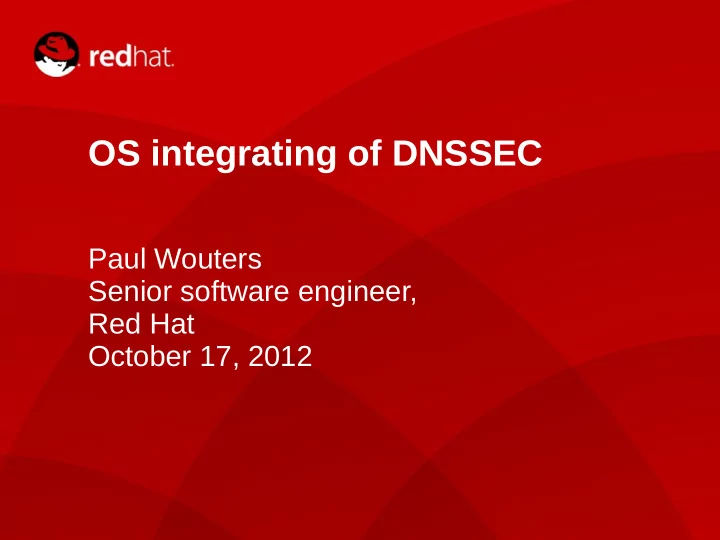

OS integrating of DNSSEC Paul Wouters Senior software engineer, Red Hat October 17, 2012 1 Paul Wouters <pwouters@redhat.com>
Red Hat Development Model ● Community driven – foster relationships with upstream ● Fedora Linux - Freedom, Friends, Features, First ● Innovation mayhem (i.e. glibc, systemd, selinux) ● Red Hat Enterprise Linux ● Enterprise quality product ● Strong security – Common Criteria, FIPS-140 ● Long term support ● DNSSEC fits in this model ● Deploy in Fedora first ● Carefully merge into RHEL later 2 Paul Wouters <pwouters@redhat.com>
The basis: Fedora and EPEL packages ● Multitude of DNSSEC packages ● resolvers: bind, unbound, libval ● authoritative: bind, nsd, pdns ● signers: bind, opendnssec ● tools: validns, dnssec-tools, dnssec-check, dnssec-system-tray, mozilla-extval, dnssec-nodes ● dnssec-trigger ● hash-slinger (formerly sshfp, now with tlsa support) ● openswan with dnssec support ● All the tools are there to build signers, resolvers, validators 3 Paul Wouters <pwouters@redhat.com>
Fedora infrastructure ● First to enable DNSSEC (and DLV) per default when installing a resolving name server ● First to ship DNSSEC keys before a signed root using dnssec-conf (discovered “rollover-or-die” bug in bind) ● fedoraproject.org first signed Oct 3 2009 (DLV, no DS) ● Publishes TLSA records for fedoraproject.org ● Hotspot detection and login page at: http://fedoraproject.org/static/hotspot.txt http://hotspot-nocache.fedoraproject.org/ ● Runs open DNS resolvers on TCP (port 80 and 443) 4 Paul Wouters <pwouters@redhat.com>
DNSSEC experience: #1 Captive Portals ● dnssec-trigger + unbound = okay (but not great) ● Try cache, then full resolver, then TCP 80, then TLS ● Need better integration with Network-Manager ● Monitor and act on Web and DNS hijacking together ● dnssec-trigger needs to reconfigure unbound for more aggressive retries, shorter negative caching ● unbound needs support for querying DNSSEC chains ● 1 query per HTTP/TLS connection does not work ● Excellent co-operation with NLnetlabs 5 Paul Wouters <pwouters@redhat.com>
DNSSEC experience: #2 VPN using Openswan ● Openswan reconfigures unbound ● IPsec XAUTH parameters received contain domain name (“redhat.com”) and nameservers (“1.2.3.4”) ● When the VPN is established it runs unbound-control to configure forwarder, flush cache for “redhat.com” and flush request list. ● When VPN disconnects it runs unbound-control to remove forwarder, flush cache for “redhat.com” and request list ● Works very well, except when VPN silently times out (happens when using OTK, i.e. SecureID) ● Openswan patch: use libunbound not gethostbyname() 6 Paul Wouters <pwouters@redhat.com>
DNSSEC experience: #3 Split DNS ● Simple split DNS (eg VPN) works ● More complicated when external and internal zones are signed – “DNS lying” is required due to DNSSEC ● Running your own resolver means using public view ● internal.redhat.com does not exist in public view ● Patched unbound to support distributing trust anchors (i.e. via puppet) ● /etc/unbound/keys.d/internal.redhat.com.key ● /etc/unbound/conf.d/internal.redhat.com.conf ● /etc/unbound/local.d/nasa-override.conf ● We need more experience with complicated DNS splits 7 Paul Wouters <pwouters@redhat.com>
TLSA Validator for Firefox 8 Paul Wouters <pwouters@redhat.com>
Generating TLSA and SSHFP records is easy ● yum install hash-slinger ● tlsa –create www.example.com ● sshfp -a (known_hosts) ● sshfp -a -d -d nohats.ca -n ns0.nohats.ca (axfr+scan) 9 Paul Wouters <pwouters@redhat.com>
DNSSEC: RHEL integration ● Wait on more experience and stability with Fedora ● As a server OS, captive portal not as important, but RHEL as desktop gaining traction and under increased security demands ● Only allowed crypto libraries: NSS, openssl, libgcrypt ● libunbound can now use NSS instead of openssl ● The unbound daemon still requires openssl ● OpenDNSSEC uses botan which is not certified ● Running in FIPS mode still causing problems ● MD5 not available (unbound, nsd,...) 10 Paul Wouters <pwouters@redhat.com>
DNSSEC: TODO list ● Support in Anaconda / NetworkManager to run validating resolver on every install (for Fedora 19?) ● resolv.conf with only 127.0.0.1 makes everyone happy! ● Integration of dnssec-trigger and NetworkManager ● DNSSEC chain support for TCP queries (IETF work) ● Single storage of root and DLV keys ● applications cannot yet be guaranteed a local resolver ● Multiple formats, multiple locations ● Long term handling of shipping DNSSEC keys, especially the root key. Grab RHEL7 from a shelve in 2020 and turn it on, will DNS still work? ● 11 Paul Wouters <pwouters@redhat.com>
Questions? Find the guy with the red hat after the panel discussion 12 Paul Wouters <pwouters@redhat.com>
Recommend
More recommend